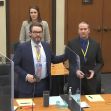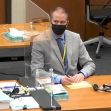Derek Chauvin’s trial for the murder of George Floyd got off to a non-start on Monday, March 8, 2021, when prosecutors filed for a three-month delay. They cited the pandemic and time required to have people vaccinated to reduce health risks as reasons for the delay.
They also requested the court wait to install the jury until after a decision is issued by the Minnesota Supreme Court about adding an additional charge of third-degree murder.
On Friday, March 5, the Minnesota Court of Appeals said Hennepin County District Court Judge Cahill had to reconsider his October decision to exclude the third-degree murder charge. The grounds Judge Cahill had cited are that the statute applies only when more than one person is threatened by the action involved.
The prosecution’s motion requested a delay until June 7, claiming that such a delay “appropriately balances the need to protect public health with the need to ensure that this case is resolved expeditiously.” They backed their motion with an affidavit from Dr. Ezekiel Emmanuel, one of the people on President Biden’s COVID-19 advisory board.
Emmanuel noted that “millions of Americans in the general population receive a COVID-19 vaccination between March 2021 and June 2021.” He went on, saying that “large public gatherings — including those conducted with proper social distancing and mask protocols — will be substantially safer in June 2021.”
He claimed that a large health risk could be avoided by shifting the trial date. “An in-person trial in March 2021 that attracts a large umber of people who are indoors for prolonged periods of time with public speaking is likely to create a substantial risk of COVID-19 transmission could even become a super-spreader event,” Emmanuel said.
Chauvin and three other officers are scheduled to be tried together. Chauvin’s attorney, Eric Nelson, said he would not object to the delay in the trial, although he is finalizing an appeal asking the Minnesota Supreme Court to review the reinstatement of the third-degree murder charge. “We’re prepared to try this case. It is not our intent to cause delay,” he said.
However, earlier in March, Nelson made a motion for a delay in the trial, claiming mishandling by prosecutors of how they shared evidence with the defense. He claimed they hid critical information amid irrelevant material, provided multiples of the same item, and produced thousands of pages of irrelevant documents.
Peter Wold, a defense attorney not associated with this case, thinks Judge Cahill will grant the prosecution’s request for a delay. “With the vaccination process going so slowly, having a trial in March for a month -- or however long it’s going to take -- the odds of one or multiple people coming down with COVID are pretty high. That would be a disaster for everyone.” Wold is a Twin Cities defense attorney.
Chauvin was initially charged with third-degree murder, which is a reckless act that threatens the lives of others. The state later added more serious charges of second-degree murder and second-degree manslaughter. Second-degree murder is unintentional and takes place during the commission of a felony. The three other former officers have been charged with abetting second-degree murder and manslaughter. Lawyers for all four men have filed court documents arguing that they’re not guilty.
Judge Cahill sent prospective jurors home on Monday but held an afternoon hearing for pretrial conditions with both sides. Both sides said they agreed to remove 16 of the first 50 prospective jurors, but there was no information given as to the reasons for their removal.
The judge said, “Realistically, we’re not going to get to any jury selection” on Monday. “We won't have an answer until at least tomorrow. So unless any of the parties object, I’m going to kick our jurors loose and start everything tomorrow with jury selection.”
Jury selection began on Tuesday, which Judge Cahill anticipated, and three jurors were seated. He had said that jury selection would proceed unless he was ordered by a higher court to stop. The court of appeals agreed to hear the request for a stay but hasn’t indicated whether proceedings should stop while they deliberate.
Minnesota’s assistant attorney general, Matthew Frank, said the third-degree murder charge would shape how prosecutors present their case, beginning with jury selection, if the charge is included. Frank requested the Court of Appeals delay the trial until the third-degree murder issue was resolved.
He said, “We’re not trying to delay this case. We want to try this case, but we want to try it right and we only have the ability to try it once.” Frank told the judge that to proceed without a resolution of the third-degree murder issue could result in a later appeal, or waste the court’s time.
Despite prosecutors’ warnings that moving ahead with jury selection without that decision could lead to an appeal, and how important it is to seat a jury as near the beginning of the trial as possible, Judge Cahill cited precedent for adding or omitting a charge after a jury is selected.
Prosecutors say that until the MN Supreme Court rules on the murder charge, the district court doesn’t have full jurisdiction to hear the case’s substantive matters, including jury selection.
Jury selection was anticipated to take two weeks. Opening arguments are scheduled for March 29. The trial should take two to four weeks. The witness list includes 400 people.






